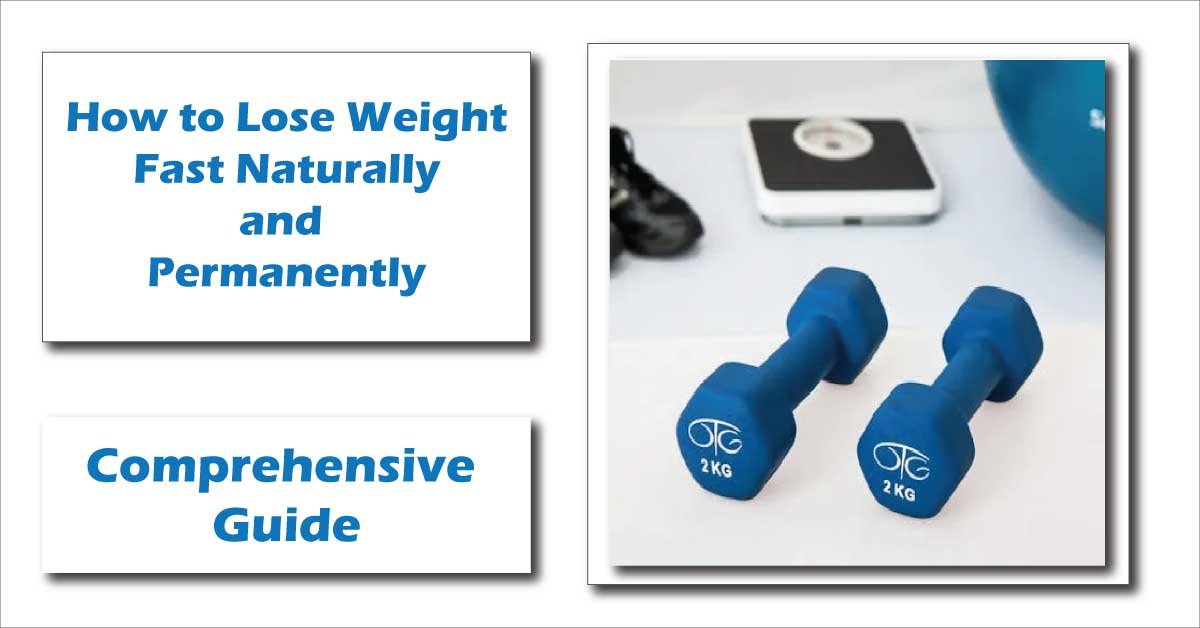Losing weight quickly and maintaining those results over the long term requires a balanced approach that focuses on natural methods. By adopting a combination of dietary changes, physical activity, and lifestyle modifications, you can achieve rapid weight loss while setting the foundation for sustainable results. This guide will explore effective, natural strategies for losing weight fast and keeping it off permanently.
Understanding How to Lose Weight Fast Naturally and Permanently
Natural weight loss involves methods that use your body’s inherent processes and healthy habits rather than relying on quick fixes or artificial solutions. The goal is to promote a healthy metabolism, support fat loss, and enhance overall well-being.
Key Strategies for Fast and Permanent Weight Loss
1. Adopt a Balanced Diet
- Create a Calorie Deficit: To lose weight, you need to consume fewer calories than you burn. Determine your Total Daily Energy Expenditure (TDEE) and aim for a calorie deficit of 500-1000 calories per day, which can lead to a weight loss of 1-2 pounds per week. Use apps or tools to track your caloric intake and expenditure accurately.
- Focus on Nutrient-Dense Foods: Choose foods that provide a high amount of vitamins, minerals, and other nutrients with relatively low calories. This includes:
- Lean Proteins: Chicken, fish, tofu, and legumes help with satiety and muscle preservation.
- Whole Grains: Brown rice, quinoa, and oats provide sustained energy and fiber.
- Fruits and Vegetables: Rich in vitamins, minerals, and fiber, these foods support overall health and aid in digestion.
- Healthy Fats: Avocados, nuts, seeds, and olive oil contribute to fullness and provide essential fatty acids.
- Avoid Processed Foods: Processed foods often contain unhealthy fats, sugars, and high amounts of sodium. These can contribute to weight gain and hinder weight loss efforts. Opt for fresh, whole foods instead.
2. Increase Physical Activity
Engage in Cardiovascular Exercise: Activities like running, cycling, swimming, and brisk walking help burn calories and improve cardiovascular health. Aim for at least 150 minutes of moderate-intensity or 75 minutes of high-intensity cardio each week.
Incorporate Strength Training: Building muscle through resistance exercises can boost your metabolism and help you burn more calories at rest. Include weightlifting, bodyweight exercises, or resistance bands in your routine at least two times per week.
Add High-Intensity Interval Training (HIIT): HIIT involves short bursts of intense exercise followed by recovery periods. This method is effective for burning calories quickly and improving metabolic rate. A typical HIIT workout might include sprints, burpees, or jumping jacks.
Stay Active Throughout the Day: Increase your daily activity levels by incorporating more movement into your routine. Take the stairs, walk during breaks, and engage in activities that keep you on your feet.
3. Adopt Healthy Lifestyle Habits
Prioritize Sleep: Quality sleep is crucial for weight management. Lack of sleep can disrupt hormones that regulate hunger and appetite, leading to increased cravings and weight gain. Aim for 7-9 hours of sleep per night to support weight loss and overall health.
Manage Stress: Chronic stress can lead to emotional eating and weight gain. Practice stress management techniques such as meditation, deep breathing, yoga, or engaging in hobbies you enjoy.
Stay Hydrated: Drinking plenty of water supports metabolism and helps control appetite. Aim to drink at least 8 glasses of water a day. Sometimes thirst is mistaken for hunger, so staying hydrated can help prevent unnecessary snacking.
Practice Mindful Eating: Pay attention to your hunger and fullness cues. Eat slowly and savor your food, which can help prevent overeating and improve digestion.
Avoid Skipping Meals: Skipping meals can lead to overeating later and can disrupt your metabolism. Instead, eat regular, balanced meals and healthy snacks to maintain energy levels and prevent excessive hunger.
4. Set Realistic Goals and Monitor Progress
Set Achievable Goals: Aim for gradual weight loss of 1-2 pounds per week. Setting realistic and specific goals can help you stay motivated and focused on your weight loss journey.
Track Your Progress: Use a journal or app to track your food intake, exercise, and weight loss progress. Regular monitoring can help you stay accountable and make adjustments to your plan if needed.
Celebrate Milestones: Recognize and celebrate your achievements, no matter how small. Celebrating milestones can boost motivation and reinforce positive behavior.
Looking to stay fit without leaving your house? Discover the benefits of home workout routines. From High-Intensity Interval Training (HIIT) for a quick, intense session to bodyweight exercises that need no equipment, you can find effective and easy-to-follow exercises right from the comfort of your home. Explore the latest fitness trends and transform your routine today!
5. Incorporate Healthy Eating Habits
Portion Control: Use smaller plates and bowls to help control portion sizes and prevent overeating. Being mindful of portion sizes can help you stay within your calorie goals.
Plan Meals Ahead: Preparing meals in advance can help you avoid impulsive eating and make healthier choices. Plan your meals and snacks to ensure you have nutritious options readily available.
Limit Sugar and Refined Carbs: Reducing intake of sugary foods and refined carbohydrates can help manage blood sugar levels and prevent weight gain. Opt for natural sweeteners like fruit and whole grain alternatives.
Potential Challenges and How to Overcome Them
1. Plateaus
Description: Weight loss plateaus occur when progress stalls despite continued efforts. This can be due to changes in metabolism or adaptations in your body.
Solutions: Reassess your diet and exercise routine. Incorporate variety, such as changing workout types or adjusting caloric intake. Ensure you’re still creating a calorie deficit and consider seeking advice from a nutritionist or trainer.
2. Cravings and Emotional Eating
Description: Cravings and emotional eating can derail weight loss efforts and lead to overeating.
Solutions: Identify triggers for emotional eating and find healthy alternatives, such as exercising, journaling, or engaging in relaxing activities. Practice mindful eating to better understand and manage cravings.
3. Maintaining Motivation
Description: Staying motivated over time can be challenging, especially if results are slower than expected.
Solutions: Set short-term goals and rewards, join a support group, or find an accountability partner. Keep reminding yourself of your long-term goals and the benefits of a healthy lifestyle.
Conclusion About How to Lose Weight Fast Naturally and Permanently
Losing weight fast naturally and permanently involves a combination of strategic dietary choices, increased physical activity, and healthy lifestyle habits. By creating a calorie deficit through balanced eating, incorporating regular exercise, and making sustainable lifestyle changes, you can achieve your weight loss goals and maintain them over the long term.
Focus on building healthy habits that support your overall well-being, and be patient with the process. Weight loss is a journey that requires consistency and dedication, but the rewards of improved health and well-being are well worth the effort.
Always remember that individual results may vary, and it’s important to consult with healthcare professionals before making significant changes to your diet or exercise routine. By following these natural strategies and staying committed to your goals, you can achieve lasting weight loss and enjoy a healthier, more fulfilling life.
Explore Fitness Regain.com for the latest workout strategies and exercise trends. Stay informed and motivated with expert advice tailored to help you achieve your fitness goals.

